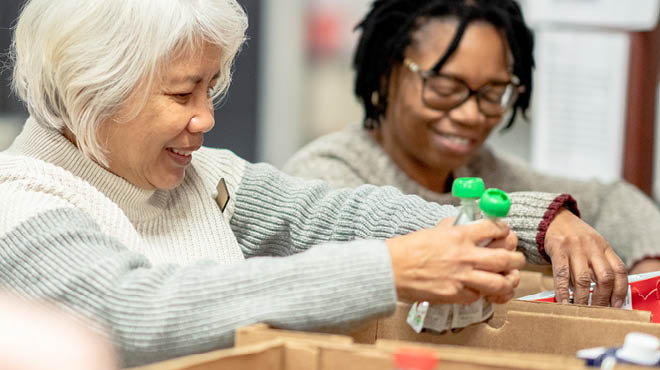Maintaining healthy relationships with age

physical activity. Even though relationships with others may evolve, maintaining a strong social network as you age can contribute to a longer, healthier life.
A social network is simply a group of people close to you. This network—made up of friends, family, co-workers, neighbors, and others—is how you give and receive instrumental and emotional support.
Instrumental support is the tangible help you give or receive through acts, such as providing transportation for a neighbor to an appointment or offering child care for friends or family. Emotional support is intended to lift someone's spirits, relieve sadness, give encouragement, or offer advice.
Giving relationships direction
Think of your networks and relationships as a convoy traveling down the road of life with you. Some of your relationships are in it for the long haul. Others use the on- or off-ramps, and some take different roads entirely. Relationships in your convoy change over time, but all provide support and contribute to your well-being along the journey.
As people age, the road can feel lonely. Caring for children or aging parents can make it challenging to maintain friendships. This is normal and means you must be more intentional about establishing and maintaining relationships, which isn't easy.
Devoting time to relationships
If you're looking to expand your social network, try a few of these ideas:
- Take note of current connections.
Do an inventory of who is already in your social network. Are there people you have already met you could reconnect with? - Make the effort to reach out.
In today's connected world, getting in touch with someone is as simple as a phone call, text message, or video visit. If you prefer a method involving less technology, send a handwritten card or letter. - Go where people are.
Attend events, church, or community activities. Look for classes or groups with people who have interests similar to yours. - Reap the benefits of volunteering.
Join or volunteer for a club or cause that interests you. Volunteering not only improves your physical and mental health and provides a sense of purpose, but it's also a great way to build new relationships. - Extend and accept invitations.
Don't worry if your social skills feel a bit rusty. An invitation to meet for coffee or go for a walk around the neighborhood may brighten someone else's day as much as it does yours. - Be available.
Relationships take time and effort. Whether connecting with a friend you've known for a long time or someone you just met, be present in the moment, and give your full attention to the person and situation.
In addition to helping provide the necessary support, establishing and maintaining positive relationships is also good for your health. They can boost your happiness, reduce stress, improve confidence, and help you cope with traumatic events.
Adults with a strong social network have a reduced risk of depression, lower blood pressure, and tend to maintain a healthier body mass index, or BMI. Building new friendships and investing time in maintaining relationships can help you on the highway of life and the path to better health.







